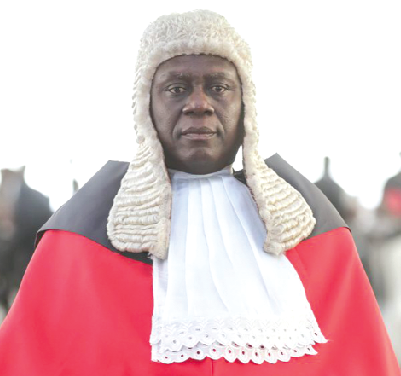
Constitutional relief for wrongful conviction, imprisonment (1)
When an innocent person has had his life stripped from him only to endure the horror of imprisonment, justice demands that upon his acquittal, the individual be compensated for the harm suffered…
By guaranteeing compensation to the wrongfully convicted, a state can take an important step towards ensuring the integrity of its criminal justice system (per Sophia Adinyira, JSC in Sabbah (2) v The Republic (2) (2015) SCGLR, 402).
Advertisement
The Supreme Court’s (SC) case of Sabbah (2) v The Republic (2) (2015) SCGLR, 402 is a seminal one in that the judgment establishes the framework within which persons who have been wrongfully convicted and imprisoned by a court, and who are acquitted on appeal, could be compensated by the SC for the judicial deprivation of the liberties of the person, and the suffering and pains of imprisonment.
The relief is a constitutional one, and opens itself for application by Ghanaians who have been wrongfully convicted and imprisoned.
We shall look at the merits of the judgment and its relevance in the criminal jurisprudence of Ghana.
Ideology
Article 14 (7) of the 1992 Constitution provides: Where a person who has served the whole or part of his sentence is acquitted on appeal by a court, other than the SC, the court may certify to the SC that the person acquitted be paid compensation; and the SC may, upon examination of all the facts and the certificate of the court concerned, award such compensation as it may think fit; or, where the acquittal is by the SC, it may order compensation to be paid to the person acquitted.
This provision is a subset of several other provisions under Chapter Five of the Constitution: Fundamental Human Rights and Freedoms.
Article 12 (1) enjoins all artificial and legal persons to respect and enforce the human rights and freedoms enshrined in the chapter.
The SC had no precedents to this case; it was the first of its kind, at my instance. I applied to the SC for compensation for my client, who had been convicted and sentenced for a crime he never committed, after the Court of Appeal had turned down the application for compensation.
Their Lordships, in a judgment of 106 pages, had to think through the intendments of the Constitution to set down the ideological basis for future reference and application of Art 14 (7).
Her Ladyship the Chief Justice, Georgina Theodora Wood, JSC and four other Justices namely: Dotse JSC, Sophia Adinyira JSC, Benin JSC and Akamba JSC, sat on the case.
The first consideration is whether compensation should be automatic or discretionary. My submission was that it should be automatic.
In the opinion of the Court of Appeal, compensation is discretionary and not automatic. The reasoning of the Court of Appeal found partial resonance at the SC.
With reference to article 14 (7), their Lordships generally agreed that the liberty given the appellate and Supreme Courts to decide on compensation revolved around the permissive “may” used in article 14 (7). In other words, if, on the totality of assessment of the case, their Lordships are of the opinion that a person does not warrant compensation, then compensation would be refused, and no one should be heard to say the courts have acted unconstitutionally.
Says the Chief Justice summarily: In sum I conclude that article 14 (7) is not a blanket provision for the award of compensation, since the jurisdiction conferred on the SC and an appellate court, which certifies, is discretionary.
Similarly, the power exercisable by the SC, on receipt of a certificate issued by an appellate court, is not mandatory, but discretionary.
In their deliberations, their Lordships underscored the philosophic underpinnings of a constitution and why its tenets must be accorded reverence and latitude of interpretation and application.
The organic nature of a constitution has been espoused in the famous statement of Sowah JSC in Tuffour v Attorney-General (1980) GLR 637 at 647-648: “A written constitution such as ours is not an ordinary Act of Parliament. It embodies the will of a people. It also mirrors their history…It contains within it their aspirations and their hopes for a better and fuller life. The constitution has its letter of the law. Equally, the constitution has its spirit. It is the fountain-head for the authority which each of the three arms of government possesses and exercises.
It is a source of strength. It is a source of power…Indeed, it is a living organism capable of growth and development as the body politic of Ghana itself is capable of growth and development.
A broad and liberal spirit is required for its interpretation. It does not admit of a narrow interpretation.”
This beautifully crafted statement of Sowah JSC is what I mean by the ideology of a constitution.
Application
Once this is known and understood, its application becomes easier and relevant to any situation that calls for its employment.
Thus Francois JSC in Kuenyehia v Archer (1993-94) 2 GLR 526 at 561 could say: Any attempt to construe the provisions of the Constitution 1992…must perforce start with an awareness that a constitutional instrument is a document suis generis to be interpreted according to principles suitable to its peculiar character and not necessarily according to the ordinary rules and presumptions of statutory interpretation.
At all times, it is incumbent on the courts to find out the purpose of any provision, and bring its intendment into being.
So, if compensation must be paid to persons wrongfully convicted and imprisoned, how could this be effected for article 14 (7) to be accomplished? Part two will answer this question.
The writer is a lawyer.
E-mail: [email protected]




